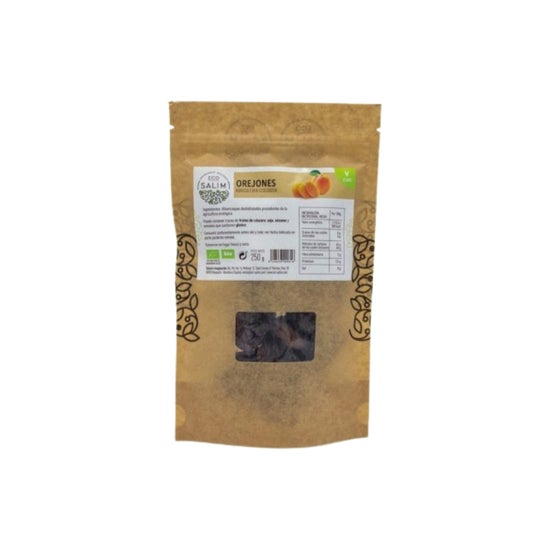The drying process of the apricot causes its water content is reduced, but in turn tends to increase the presence of simple carbohydrates, as well as its nutritional content is also higher. From a nutritional point of view, there is no doubt that apricot apricots become an excellent contribution in vitamins such as provitamin A (beta-carotene, which becomes vitamin A, essential for vision), vitamin B3 or niacin and vitamin C, although this time in smaller quantities. Regarding the minerals it provides, it stands out as an excellent source of calcium, potassium and iron.
Int-Salim Orejones Apricot 250g
Log into your account and set up an alert to be notified when the product becomes available again.
Do you want us to notify you when it is available?
Description
Instructions for use
To be consumed directly.
Composition
Apricot kernels and preservative E220.
Pharmaceutical Advice
Iron is a functional mineral that contributes to the body's growth and development. It is present in haemoglobin and myoglobin. These proteins transport oxygen from the lungs to the rest of the organism. Iron is also involved in the creation of hormones and connective tissue.
Our organism absorbs this mineral from foods such as seafood, lean meat, eggs, pulses and nuts. To facilitate its absorption, it is advisable to add acidic foods rich in vitamin C, such as orange or lemon juice, to the diet. A lack of iron in the diet can cause iron deficiency (anaemia). In the long term, it can lead to symptoms such as a constant lack of energy, fatigue, intestinal disorders and/or difficulty keeping body temperature under control. Lack of iron can be restored through a varied diet. If this is not enough, it can be mitigated through supervised supplementation. It is essential to follow the advice of a healthcare professional and always avoid taking an iron dietary supplement without checking if you are deficient in this mineral.
The body's iron requirements will change throughout the years. It is particularly important to regulate it during the years of menstruation, as well as in pregnant women and infants. Iron is also actively involved in development and growth and is therefore very important for newborn babies.
Safety and product information
Safety visual aids
At this time we do not have safety images for this product, but we are working on it. We encourage you to check back later for updates. In the meantime, we recommend that you read the safety information that comes with the product before using it. If you have any questions about safety, please do not hesitate to contact us. Also, if you wish, you can also return the product by following our terms and conditions.
Manufacturer details
At the moment we do not have the manufacturer's details, but we are working to add them as soon as possible. We invite you to check back later for updates. If you have any questions, please do not hesitate to contact us, we will be happy to help you.
RELATED SEARCHES ABOUT Food
New in Nutrition
- Inmunicaps 14caps
- Euphytose Noche 1Mg Spray 20 ml
- Arkopharma Activox Própolis Spray Garganta 30 ml
- Santarome Somnifor Max Lp 8H 15comp
- Mayla Sisteurin Biotic + 10 Sticks
- Superlativa Botanicals Forte 10x20ml
- Alvityl Méla-Sommeil Lib 30comp
- Menarini 8:Mel+ Melatonina 30comp
- Upsa Hydrafizz Fresa 16comp
- Prescription Nature Herpesyl 60caps

